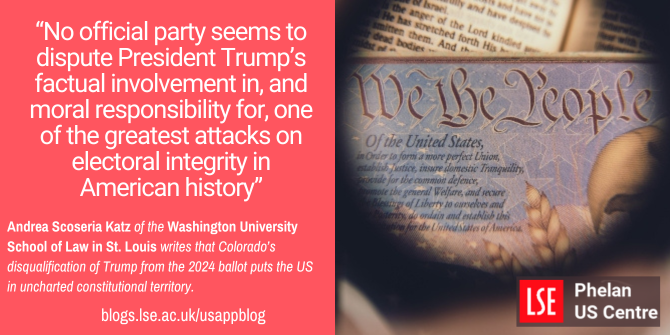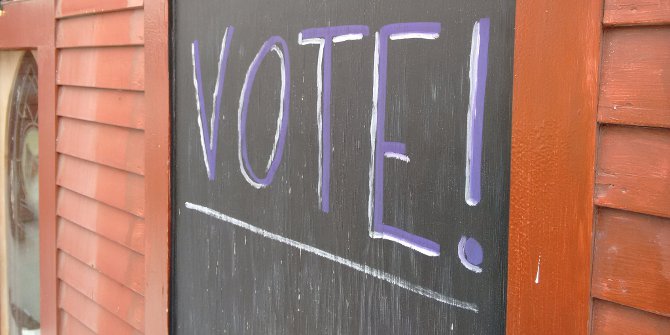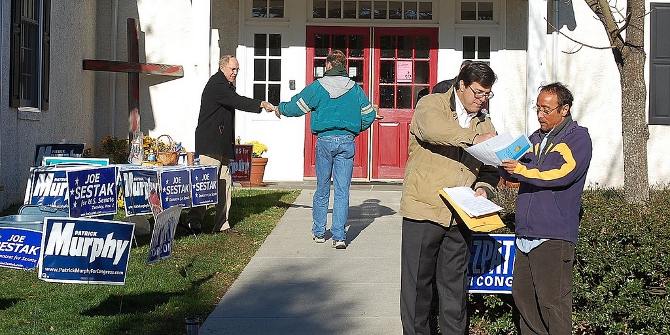 What does the Colorado Supreme Court’s decision this week that Donald Trump is ineligible to run in the state’s Republican Primary mean for the 2024 presidential election and US politics more widely? Andrea Scoseria Katz gives an overview of the background to the case and decision and writes that while many commentators have suggested the opinion will soon be overturned by the US Supreme Court, the Colorado decision is a fundamentally a conservative one which upheld the former president’s role in the January 6 insurrection.
What does the Colorado Supreme Court’s decision this week that Donald Trump is ineligible to run in the state’s Republican Primary mean for the 2024 presidential election and US politics more widely? Andrea Scoseria Katz gives an overview of the background to the case and decision and writes that while many commentators have suggested the opinion will soon be overturned by the US Supreme Court, the Colorado decision is a fundamentally a conservative one which upheld the former president’s role in the January 6 insurrection.
On Tuesday night, the Colorado State Supreme Court caused a national uproar with a first-of-its-kind opinion finding that a little-known provision in the Fourteenth Amendment of the US Constitution disqualifies former president Donald Trump from running for office in Colorado next year. One observer called it “a rebuke that will reverberate through the ages no matter whether the United States Supreme Court chooses to uphold it.”
The court seemed well aware of the shockwaves its decision would create; writing in unanimous per curiam fashion (a collective decision not authored by a specific justice), the four justices in the majority observed, “We are mindful of the magnitude and weight of the questions now before us,” and “cognizant that we travel in uncharted territory.” Nevertheless, the Court was resolved “to apply the law, without fear or favor, and without being swayed by public reaction to the decisions that the law mandates we reach.” Those assurances appear to be of little comfort to disgruntled supporters of the former president, who has already vowed to challenge the ruling.
The Colorado Supreme Court’s decision
The constitutional passage at issue here, Section 3 of the Fourteenth Amendment, which dates to the aftermath of the Civil War, bars any “civil or military” officer from holding office if they “engaged in insurrection or rebellion against” the Constitution of the United States. Under Colorado law, the Secretary of State has a duty to not list “unqualified candidates” on the ballot, and over the course of 133 pages, the state Supreme Court concluded that President Trump had engaged in an insurrection through his actions at the US Capitol on January 6, 2021, and was therefore no longer “qualified.”
For the better part of November, the facts surrounding the January 6 attacks were given a thorough airing before a lower Colorado district court tasked with weighing the complaint first. After five days of evidence and two weeks of closing arguments (who but a lawyer could describe a two-week stretch of a trial as “closing”?), Judge Sarah B. Wallace issued her ruling: Section 3 did not apply to Trump (or any president) because the presidency was not an “officer of the United States.”
That reasoning earned widespread criticism, but it was not the only unusual thing about the opinion. Judge Wallace spent 20 pages establishing that the evidence of against Trump was credible, then 70 pages more narrating the former president’s complicity in the attacks before demolishing the whole edifice in the last six pages. The unsuspecting reader could be forgiven for asking: why bother to establish that Trump “engaged” in an insurrection, then? One astute commentator (Harvard University’s Laurence Tribe) proposed that perhaps the “presidency is not an officer” conclusion was somewhat for show: after all, what the opinion had achieved was to build up a written record against Trump while ducking blame for disqualifying him.

Photo by Anthony Garand on Unsplash
States are also able to determine if candidates can run for president
In retrospect, Tribe’s hunch appears correct. The Colorado Supreme Court’s four-justice majority did reject Judge Wallace’s parsing of the term “officer”—pointing out, instead, 25 instances where the Constitution refers to the president as an “officer” and reasoning that Section 3 could hardly have “disqualified every oath-breaking insurrectionist except the most powerful one.” But they blessed her work with respect to all other crucial points. The district court had not committed reversible error in finding Section 3 to be self-executing: meaning that while Congress has the power to decide as to ineligibility, it does not have to, and this authority also does not preclude states from doing so.
The district court’s conclusion that January 6 had been an “insurrection” could be upheld without difficulty, because under “any definition of ‘insurrection,’” the Court wrote, “a concerted and public use of force or threat of force by a group of people to hinder or prevent the U.S. government from taking the actions necessary to accomplish a peaceful transfer of power in this country” would count (my emphasis). Had President Trump “engaged” in an insurrection? Here, the justices leaned on the record built by the district court:
[T]he foregoing evidence, the great bulk of which was undisputed at trial, established that President Trump engaged in insurrection. President Trump’s direct and express efforts, over several months, exhorting his supporters to march to the Capitol to prevent what he falsely characterized as an alleged fraud on the people of this country were indisputably overt and voluntary. … President Trump undertook all these actions to aid and further a common unlawful purpose that he himself conceived and set in motion: prevent Congress from certifying the 2020 presidential election and stop the peaceful transfer of power. … Even when the siege on the Capitol was fully underway, he continued to support it by repeatedly demanding that Vice President Pence refuse to perform his constitutional duty and by calling Senators to persuade them to stop the counting of electoral votes. These actions constituted overt, voluntary, and direct participation in the insurrection.
Why the Colorado Supreme Court decision may not be good news for Trump
Despite a fairly robust consensus that the US Supreme Court will eventually step in and overturn Colorado’s disqualification, there are two features of the Colorado opinion(s) that portend poorly for the former president and current GOP frontrunner. One is methodological. Despite the fact that all seven of Colorado’s Supreme Court justices are Democratic appointees, Tuesday’s opinion was a textbook display of “three stalwart principles of judicial conservatism,” as law professor Kimberly Wehle of the University of Baltimore put it: textualism (the judicial maxim that the “plain meaning” of the Constitution should be applied), originalism (historical sources should be employed to determine the meaning of a text at the time of its writing), and federalism (judges should respect the dual sovereignty of the fifty states, along with states’ authority to construe their own laws). When it comes to that key term “insurrection,” an originalist court applying the “plain meaning” of the word as it was used in 1866 would likely find it means something rather broad, indeed: “large-scale unlawful resistance to government authority,” even if “fall[ing] short of outright rebellion,” (emphasis in original) as Will Baude and Michael Stokes Paulsen have concluded.
The second point of interest concerns the relative mildness of the three dissenting justices’ objections, who each wrote separately to express concern that airing complex constitutional issues in the format of an ordinary electoral dispute (which, formally speaking, this was) gave candidate Trump insufficient due process. Notably, none challenged an official version of events that situates Trump within an extended web of apparent fraud, coercion, deceit and violence upon the Constitution.
Ultimately, the US Supreme Court may be prepared (indeed, “desperate” might be the better word) to nip Colorado’s challenge in the bud to stave off a dismaying game of Whack-a-Mole where fifty states create a patchwork electoral map as they independently attempt to adjudicate an archaic provision of constitutional law. If the Supreme Court takes the bait dropped by Colorado’s dissenters, it will do so on procedural grounds—for instance, by requiring Congress to pass implementing legislation before a state can act. At that point, whether it matters or not that Colorado has set down a written record of the events of January 6 is a matter of debate. So far, no official party seems to dispute President Trump’s factual involvement in, and moral responsibility for, one of the greatest attacks on electoral integrity in American history. Whether it is wiser to use the organs of state power to punish him, or leave it to the voters’ best judgment, remains uncharted territory for the courts and for the nation.
- Please read our comments policy before commenting.
- Note: This article gives the views of the author, and not the position of USAPP – American Politics and Policy, nor the London School of Economics.
- Shortened URL for this post: https://bit.ly/3RP41Zf







Clear and concise in contrast to the legal arguments of Trump’s attorneys as they try to muddy the waters and delay the inevitable legal proceedings of Jack Smith.